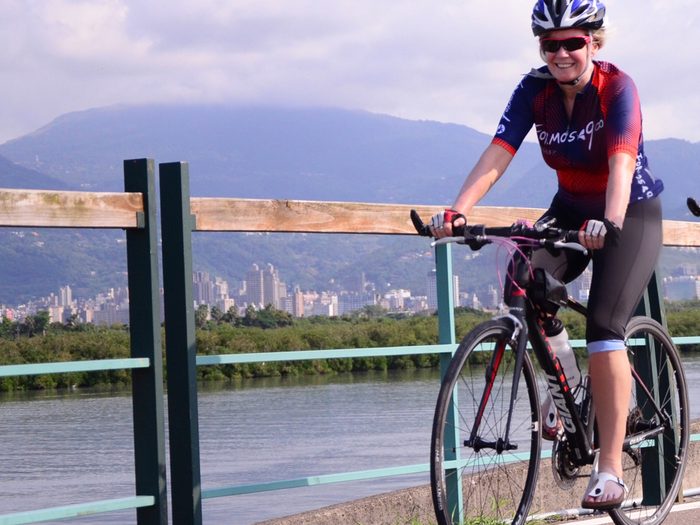
Wellness, Far-East Style
When I set off for a cycling trip to Taiwan in November, I knew it would give me a welcome healthy boost just as the Canadian winter was setting in. And it sure did: there’s simply nothing like traveling on two wheels. I found Taiwan is an amazing place to do it, too. There’s incredible cycling infrastructure; not only are smoothly paved, dedicated bike lanes part of the fabric of towns and even major cities like Taipei, there’s a 900-kilometre cycling route around Taiwan’s circumference.
Each year, cycling enthusiasts travel here for the Formosa 900 round-island tour as part of the Taiwan Cycling Festival. My small group did a few select sections of this route, ably led by our guide Min Hseih of Giant Adventure. So, I went to the Far East for some fresh air and fitness. But along the way, I picked up a few extra wellness ideas, not only in Taiwan but in nearby Hong Kong.
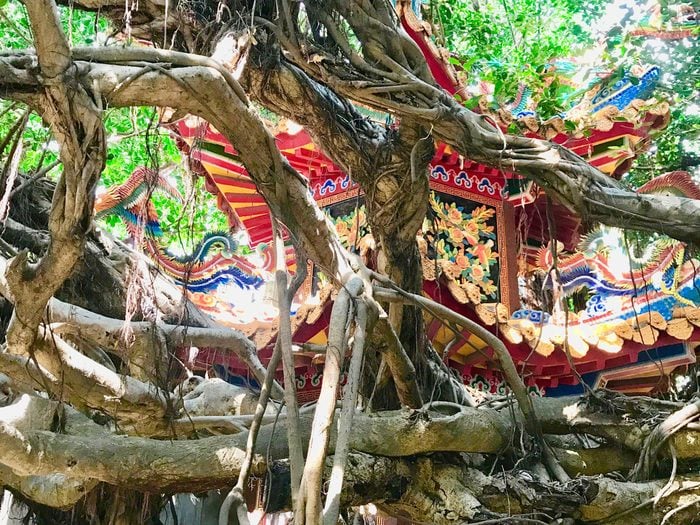
Forest Bathing
Part of our cycling was on the Penghu Islands, an archipelago to the west of Taiwan. It was really hot—over 30 degrees Celsius—and very windy. So it was a pleasure to take a break in the quiet shade of a 300-year-old banyan tree that literally envelopes an early Qing Dynasty Taoist temple called Bao An, in the village of Tungliang.
In this part of the world, the practice of “forest bathing” doesn’t involve water; it’s simply spending time relaxing among trees. Shinrin-yoku is the Japanese term for this, and breathing in the forest air is thought to be good not just for the soul, but also the body: A 2017 study out of Taiwan showed that when people spent two hours in a forest setting, their pulse rate, systolic and diastolic blood pressure were significantly lower, indicating physiological benefits thanks to stress recovery.
It’s also a natural form of aromatherapy, since many forest plants give off fragrant molecules called terpenes, which have been shown to have health benefits.
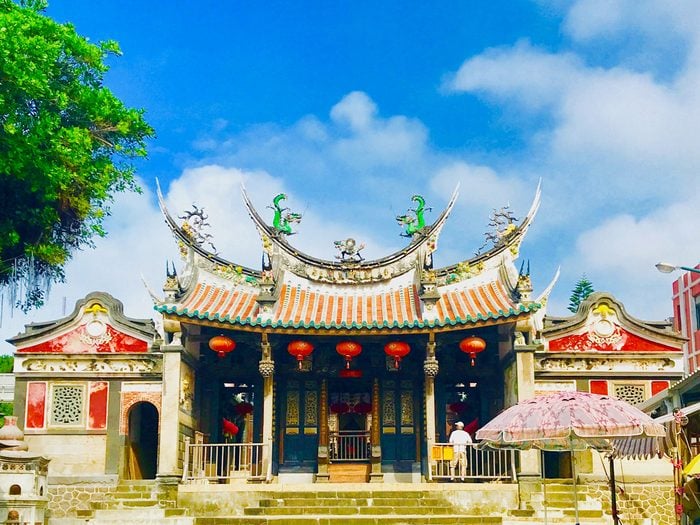
Temples of Calm
I found it an absolute treat to be able to take a break from the bike every so often and enter the calm, incense-scented air of one the many temples here. It seems there is a Buddhist or Taoist temple around every corner in Taiwan. Not only are they colourful and beautiful on the outside, they are sanctuaries on the inside. Many people here visit their local temple daily, making it a ritual to light incense and pray. Temples across this part of the world are intended as sanctuaries not only for worshipping but calming your mind, reflecting and meditating—the benefits of which are well known.
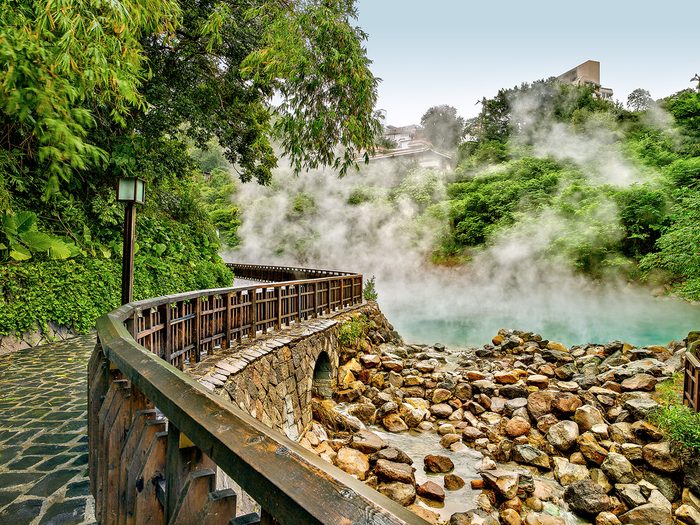
Contrast Hydrotherapy
Taiwan is a volcanic, mountainous island, and as such has many natural hot springs—in fact, it’s ranked as one of the best places in the world to experience these therapeutic waters. They’re said to not only soften the skin (thanks to the water’s mineral content) but also disorders of the nervous and digestive systems, circulation, and the organs.
I visited some hot springs on the outskirts of Taipei called Beitou, at which you are made to have an extremely cold shower before plunging into the spring’s hot water—and there’s apparently a benefit to that, too. Alternating hot and cold can water benefits specific pain like inflammation from a sports injury. It can also help with repetitive strain injuries.
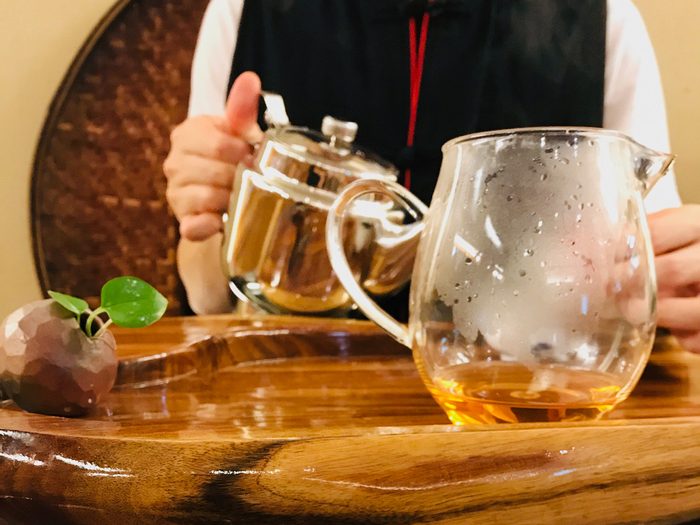
Tea Ceremony
I was feeling rather stressed finding my way through the bustling city of Taipei, with its wide, busy streets, its crowds on the subway underground and the sidewalks outside. So arriving in the “old town” Dadao Chen neighbourhood, with narrow side streets and quiet, leafy parks, was a relaxing change of scenery.
Tea-drinking is a big part of Chinese culture, so I had to visit Wang Tea, one of the oldest tea shops in Taipei. My host, Jason Wang, showed me how to make the perfect cup of Oriental Beauty, an exclusive blend. I loved watching the ceremony of it all. He didn’t quite boil the water—“It should be under 90 degrees Celsius,” Jason said—and then he decanted the water into a small china cup, and put a lid on it. We waited, chatting quietly. A couple of minutes later, he poured the steeped tea into a larger glass teapot, then decanted more hot water into the small cup. And we waited. (This was no place to be in a rush, which is in itself relaxation-inducing.) Finally, when the glass pot was full, Jason poured us each a cup of the orangey-pink tea.
Besides the health benefits of drinking tea, there’s got to be something beneficial to slowing down and sitting to enjoy it, rather than grabbing a takeout cup and rushing on to the next appointment like we do in North America. I know that when I walked out the old wooden doors of Wang Tea, I felt revitalized and ready to tackle the city once again.
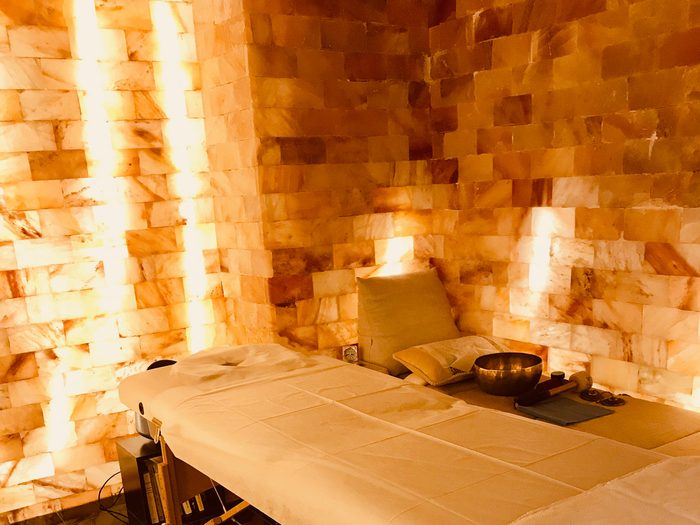
Gong Massage in a Salt Room
I decided to add a couple of days to the end of my Taiwan trip to visit Hong Kong, just a short flight away, and while there I wanted to experience something I’d only read about: Gong massage, also known as sound massage or singing-bowl therapy. Riding the elevator up to the 10th floor of a tall, skinny building in Wan Chai, on Hong Kong Island, I was mystified as to what to expect.
Sound Therapy Hong Kong co-founder Jennifer Tang greeted me and took me into a room with glowing salt walls where I’d have my gong massage —there are 20 tons of pink Himalayan salt bricks on the premises!—and explained the salt is good for respiration, among other benefits.
The massage was unlike any I’d had before. The “masseuse,” Hattie, placed a heavy brass singing bowl—it weighed about 8 pounds—on my stomach, then chest, thighs, even the bottoms of my feet, and rubbed a stick around the inside of the bowl, which emitted a vibrating sound. Every so often, she’d take a soft mallet and knock the sides of the bowl. The sound was deep and reverberating, and I could feel the vibrations deep within my body.
According to a 2016 study, sound massage with these singing bowls has the potential to reduce stress, anger, depression, and fatigue.
“The striking of the bowl breaks blockages in the body,” Jennifer told me afterwards. “And the rhythm of the bowl works on our body’s rhythm to return us to a balanced condition.”
I won’t argue with that. I walked out of Sound Therapy feeling wonderfully relaxed.
Next, discover which U.S. town people are heading to for a truly spiritual getaway.
